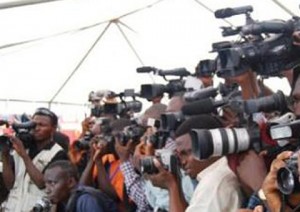Journalists reject calls for licensing regime
 Some renowned Ghanaian journalists have mounted a stern opposition to calls for the licensing of journalists in the country, saying it would be an affront to free speech.
Some renowned Ghanaian journalists have mounted a stern opposition to calls for the licensing of journalists in the country, saying it would be an affront to free speech.
Proponents of the licensing regime are convinced it was the surest way to ensure responsible journalism and combat the scourge of fake news, but the journalists have booted the idea as a nonstarter.
The matter became a subject of heated debate at a Press Freedom forum and media training session organised by the US Embassy in partnership with the University of Cape Coast (UCC) and the Ghana Journalists Association (GJA) in the Central Regional.
Dr Kwadwo A. Tuffour with the Department of Peace Studies and the School for Development Studies, UCC, argued that if journalists were licensed, they would act more responsibly.
He advanced that since professionals such as doctors, teachers and lawyers were licensed, journalists who performed equally important duties and whose actions and inactions could burn the nation must also be regulated by a licensing regime.
“Journalists must be licensed, yes you should be licensed because if you are licensed and your license can be suspended, you will be more careful about what you say,” Dr Tuffour who is also with the University’s Faculty of Law insisted.
But Madam Emefa Apawu, a broadcast journalist with Joy News, pushed back strongly, maintaining that licensing was not the answer to bad journalistic practice in Ghana.
“Can you imagine a politician just waking up one day and decides to regulate how you speak?” she queried.
She said the journalistic code of ethics and the existing laws governing proper communications sufficed for responsible journalism and urged journalists to abide by them.
Mr Zakaria Tanko, an astute journalist, communication lecturer and a lawyer, indicated that an attempt to regulate free speech would not only be an assault on journalists but also on the entire society.
“People have tried many times, but you will always come against the international community because the practice of journalism is linked to one of the fundamental human rights which is freedom of expression and freedom of speech,” he said.
Mr Tanko, who is a lecturer with the University of Media, Arts and Communication (UNiMAC-GIJ), observed that attempts by governments to regulate the media had never been for legitimate reasons but for their parochial political interest.
“Here in Ghana, the law on the publishing of information has the tendency to create fear and panic; that is a 1960 law, but we still maintained it in the Electronic Communications Act of 2008.
“They have arrested a number of journalists for that but not one prosecution has taken place. Why? Because they want to use that as the bargaining chip so that you will always be looking over your shoulders,” he stated.
Mr Tanko indicated that journalists were not given the privilege because they were more intelligent but because they were responsible for holding duty bearers accountable.
He maintained that in an era of technological advancement and citizen journalism, it was impossible to stop people from laying claim to journalism, but professional journalists could differentiate themselves by sticking to the code of ethics and abiding by the laws.
For his part, Mr Emmanuel Dogbevi, Managing Editor of Ghana Business News and media trainer said the subject was controversial but sided with the opposition to the call.
“Ethics of the profession should make journalists conscious enough to do the right thing,” he said.
The forum also discussed poor media funding, misinformation, disinformation and mal-information, and attacks on the press among critical issues affecting the media and journalists and how they could be resolved.
Selected journalists from the Central Region, and students from UCC Communication Studies, Academy of Christ the King, Adisadel College, St Augustine’s College, Mfantsipim School, University Practice Secondary School among others, attended the forum.
On the other hand, the media training, facilitated by Mr Tanko, focused on the legal perspective of the safety of journalists and professional use of social media.
Mr Kevin Brosnahan, Press Attaché at the US Embassy in Ghana, noted that professional journalism was a critical part of transparent democracy as it held leadership accountable.
To that end, he said a well-trained journalist was key to playing that role because they had the duty to ask questions, request for evidence and require facts.
Furthermore, he indicated that the fight against false and misleading information was too much for journalists alone to handle, urging all citizens to learn how to verify information to avoid spreading false news.
He also expressed disquiet over the poor performance of both Ghana and the US in the Press Freedom Index and called for immediate action to improve the situation.
Source: GNA
